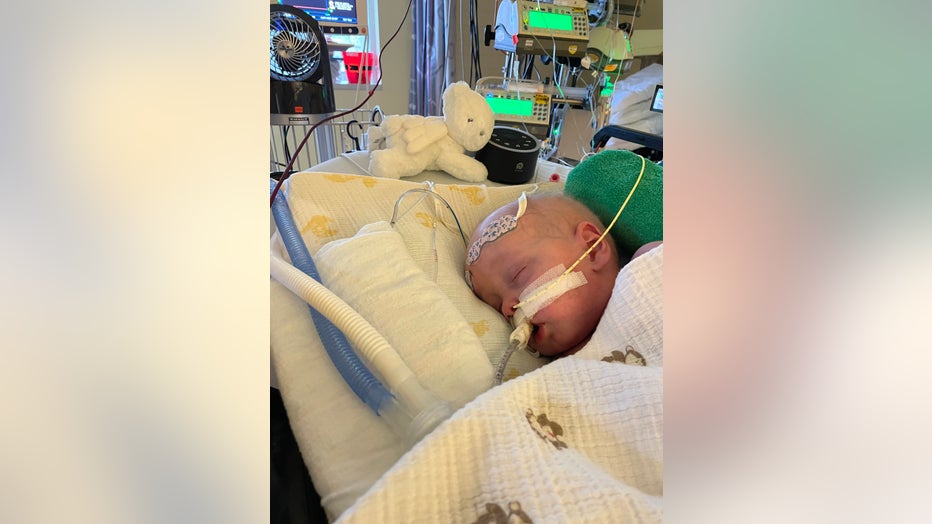Mother of toddler with life-threatening heart defect tells parents, 'Trust your gut'

Toddler recovers after open heart surgery
A Savannah area woman says her life changed in an instant after doctors diagnosed her baby with a severe heart defect. In less than 24 hours, AJ Murray went from being at home to being in an operating room hundreds of miles away at Children's Healthcare of Atlanta. His mother knows it will be a long road to recovery, but hopes her baby can home again someday.
ATLANTA - At the end of a Zoom call, Ashley Murray turns her phone camera on her 1-year-old son AJ, who is smiling at her.
The Savannah-area toddler has been in Children's Healthcare of Atlanta at Egleston for over 3 months.
"I'm just glad that he's here, and that's all I can ask for," Murray says. "He's healthy, he's happy, and he's cutting 7 teeth."
AJ Murray was born three weeks prematurely in January 2021.

AJ Murray was diagnosed at 9-months with a life-threatening congenital heart defect (Ashley M)
"When I took him home, I noticed he breathes really, really funny, like it was really labored," his mother remembers. "You could see his neck muscles retract when he would breathe."
Murray says she asked her pediatrician about it, and the doctor reassured her babies born prematurely sometimes have breathing issues.
But at AJ's 9-month checkup in October, she says, it was clear something was wrong.
GEORGIA WOMAN IS BACK IN THE GYM AFTER SURVIVING 6 HEART ATTACKS
He was battling a virus, and his white blood cell count was abnormally high.
Rushed to a Savannah ER, AJ Murray was diagnosed with a life-threatening heart defect, and Amanda and her son found themselves in an ambulance headed to
Children's Healthcare of Atlanta.
Dr. Fawwaz Shaw, a cardiac surgeon at Children’s Heart Center, says the toddler's heart was extremely unstable.
GEORGIA SENATOR, SON RECOVER AFTER KIDNEY TRANSPLANT
"When AJ first got to us, he was critically ill," Shaw says. "He actually had a cardiac arrest shortly after arrival. And, for this family, it was even more challenging because 24 hours before, they had no idea that their baby had a critical heart problem.
Dr. Shaw believes AJ was likely born a mitral valve problem that had gone undetected, known as mitral valve stenosis.
"In AJ's case, the valve was narrowed and also leaking."
A backup of blood in his heart was causing the pressure in AJ's lungs to rise, and both sides of his heart to fail.
The only real option, his mother was told, was open-heart surgery to replace the valve with a mechanical one.
"All I remember is that he said the odds weren't really in our favor and that he was going to do everything he can to save him," Murray says.
Dr. Shaw says AJ's late diagnosis is extremely unusual.
"It's extremely unusual to have a child like AJ, where they have gone for such a long time with an undiagnosed congenital heart problem," he says.
Shaw says most congenital heart defects are detected before babies are ever born or through newborn oxygen screenings.
He thinks AJ's heart defect allowed him to have relatively normal oxygen levels, which may have masked the problem, even though Ashley Murray sensed something was off.
"He couldn't play," she says. "He couldn't sit up. He wouldn't even eat solid food."
At 9-months, she says, he weighed only 11 pounds.
"It's hard, because, deep down inside, I knew that something wasn't right, and nobody listened," Murray says, her voice choking.
Three months after his heart surgery, AJ is still recovering, as Dr. Shaw and his cardiac care team focuses on reducing the blood pressure levels in his lungs.
"He still has a very long road ahead of him, in terms of being able to leave the hospital," Dr. Shaw says. "But none of that was unexpected, given how sick he was."
But Ashley Murray she will one day be able to bring AJ home.
"It will mean everything, for him to be able to come home with us," she says.
WATCH: FOX 5 NEWS LIVE COVERAGE

